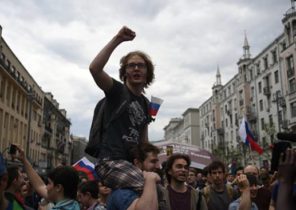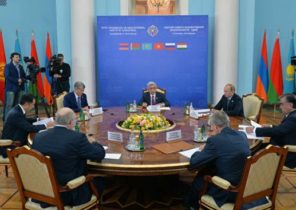The most famous in the world belongs to the Russian writers Fyodor Dostoevsky. His works have been translated into many European languages, you can find them on the shelves of European shops, they are included in the curriculum. At the same time in Russia, Dostoevsky is not in first place among the authors. It can be understood. Because this author often spoke unpleasant of Russians, showing the dark side of the “Russian soul.” Where he got it?
Arsene rucinski, thoroughly knew the work of Dostoevsky, believed that the reason for this was the roots of Ukrainian writer. He compared it with Nikolai Gogol. By the way, Dostoevsky is extremely highly valued Gogol — maybe, he felt “the native soul”. Rechinsky wrote: “If Gogol fluctuated between two souls and could not give preference to any of them (this refers to fluctuations between the soul of Ukrainian and Russian. — P. K.), after this comes the thinker who is completely surrendered to the Russian culture, which is Ukrainian soul only occasionally sounded kind of motives, incomprehensible and alien to Russians. It was Fyodor Dostoevsky. His ideas in the Bud already meet Gogol. On the one hand, faith in the salvific role of beauty in the world; on the other, the intention to expose the life without light, to immerse the soul into the dark abyss of evil and thereby to make her shudder and wish the light… This method is most used by Dostoevsky”. You can probably agree with Rachinski that deep layers of mentality Dostoevsky — Ukrainian. And it found specific manifestations in his work.
So, the writer was born in Moscow, lived mainly in Russia, was influenced by the Russian culture. However, its roots are on my father’s side is from Ukraine.
When it comes to the origin of Dostoevsky, it is possible to meet opinion that, say, his ancestors came from Belarus. Daniel started the race Dostoevsky, belonged to a Tatar family Rtishchevo. He arrived from Muscovy to the Pinsk. And here in 1506 got possession of the village of dostoevo. From the name of this village and the name of the kind of Dostoevsky, who “rooted” in Volyn Polissya.
Now dostoevo is located in the Ivanovo district, Brest region of Belarus. However, it is not Belarusian, and Ukrainian ethnic territory. This village is near the border of Ukraine and Belarus. However, in reality the ancestors of Dostoevsky lived not so much in dostoevo, how many in the Volyn region, more precisely — on Cooldine. In the 70-ies of the XVI century there was a Feodor Dostoevsky, he served with Prince Andrei Kurbsky. In 1664 a year in the village of Sekun ‘ (near Kovel) mentioned about another Dostoevsky.
There is some information about the monk of Kiev-Pechersk Lavra Cindie Dostoevsky, who lived in the XVII century “When my ancestors wrote the writer’s daughter Lubov Dostoevskaya, left the dark woods and swamps of Lithuania, they were probably illuminated by the light, colors and the Hellenistic poetry of Ukraine; their soul was warmed by the sun and turned into poetry.” Love Dostoevsky, based on the related legends, told me that one of her ancestors in the seventeenth century wrote “bucolic poem”, which, however, did not survive.
But we come to a verse from the Pochaev “of Bogopane” (1790). This collection, published in one of the oldest Ukrainian monasteries (at that time he was a Unitarian), which is a unique monument of Ukrainian culture. “Pogoplank” is a peculiar result of more than two hundred year tradition of creating spiritual songs in Ukraine. It 249 songs, among them Ukrainian — 213, Polish — 33, Latin — 3. The Ukrainian song was written as the old Ukrainian language and the language closer to the spoken. In “Logoplaste” noted the authors of only a few songs. Among them is Dostoevsky.
Probably the author of this poem was one of the ancestors of Fyodor Dostoevsky, for example, his grandfather Andrew. The language of the verse though, and had at its core tserkovnoslov, but was close to the Ukrainian spoken. Here one of the fragments of this poem:
“If nesterpimo sorry Tom pride, Who from his temple idly otide. Colico better lisisa castle, Postigo BDI pekela hell.” About this language he wrote at that time his works and Skovoroda.
The poem says that we must abandon worldly goods, and think about the divine and to seek salvation. Such motifs are found in many works of Ukrainian writers of the XVI-XVIII centuries — Ivan vyshenskogo, Vitaly Dubno, Isaiah Kopinsky, and others.
Perhaps the ancestor, Fyodor Dostoevsky was the author and other spiritual poems “Bugagashka”. After all, many works of this type is not signed. But whatever it was, I can say that the Dostoevsky family was a strong Ukrainian religious tradition and the ancestors of the writer did not neglect literary work. Not hence his interest in literature, as well as appeal to religious issues, which is particularly evident in the late period of creativity of Dostoevsky.
In 1775 the writer’s were forced to leave Volhynia. They sold their possessions Klychkovychi (now a small village turiysk district of Volyn region). Then great-grandfather, Fyodor Dostoyevsky, Gregory Gumerovich moved to Anushole, where he became Greek Catholic (Uniate) priest. His two sons were also priests. One of them, Andrew, the writer’s grandfather, served in the village Viitivtsi on the tail in 1782-1820 years, He had to go from the Unia to Orthodoxy. His son Leo has also served in Viitivtsi priest. Another son, Michael, the writer’s father, was studying for the priest, he studied at the Podolsk Seminary in Sharhorod. Out him as one of the best students was sent to study in Medical-surgical Academy in Moscow, where he settled. In Moscow and was born Fyodor Dostoevsky.
Although his father Fyodor Dostoevsky was in Moscow, but it was formed in the bosom of traditional culture of the Ukrainian clergy. And this culture, at least in part, he passed on to his son. There are not any deep religiosity by Fyodor Dostoevsky, which is a little in tune with the religiosity of the Russian, but which fits the context of the religious traditions of Ukraine XVI-XVIII centuries?
In the end, in the writer’s works marked a “Ukrainian trace”. For example, in the first work of Fyodor Dostoevsky’s “Poor people” many Ukrainian. This cordial attitude to the poor, insulted by the society people (something like we see in Nikolai Gogol, in particular in his “the Overcoat”). In the end, the novel a lot of ukrainianism. So, the hero of the novel often refers to the heroine works “yasochka mine.” Even found the word “Walt”, which is not used in the Russian language. However, it came from German through Polish, was widely used in Volyn. “The Ukrainian trace” can be found in other works of the writer. For example, they can be traced in the story “Teen”. The language works too, there are ukrainianism. Is there a connectedness and attachment to nature, a kind of natural life-affirming optimism inherent in the Ukrainian mentality.
Of course, it makes no sense to “take away” by Dostoevsky in Russian literature. But keep in mind that the roots of Ukrainian writer significantly influenced his Outlook and work.
Dostoevsky, in particular, believed that Gogol died at the inability to create and accurately determine for themselves the ideal which he could not to laugh. From here you can understand the creativity of Dostoevsky himself. He wanted to believe in the Russian soul and to indicate for Russia a Messianic ideal of a “spiritual renewal”. But Russian society was too far from reaching that ideal.
The most famous work of Dostoyevsky is the novel “the Brothers Karamazov”. One of the characters, the nihilist Ivan Karamazov, draws the image of the future of the human community, organized according to the system of Catholic science or in the spirit of socialist theories. Humanity is divided into a handful of an escort (led by Grand Inquisitor) and the rest of the people who live in small interests that are even glad that they are like a herd. In this community they will be bread, and the resolution is a little sin — provided, of course, preservation of loyalty to companion. For this they are ready to renounce freedom, which for them is only a burden.
It seems that Dostoevsky identifies the social ideal of Catholicism and socialism. But the social ideal is Ivan Karamazov, is a kind of “community”. It is ideal not only socialist, but the fact of national-Russian. Dostoevsky first rejects it. And this is evident not only in “the Brothers Karamazov”, but in other works, in particular, in the novel “Demons”. The writer foresaw the “charms” of Russian collectivist Paradise, Asian equality in slavery. It was a protest of the Ukrainian soul against the Russian herd, riot units against an abstract “humanity.”
By the way, some thinkers have drawn attention to the fact that Bolshevism was not only a continuation of the traditions of Marxism and of socialism as a continuation of the Russian tradition. One of the first who spoke about it was Nikolai Berdyaev. These ideas he voiced in “the Origins and meaning of Russian communism” (first published in English in 1937). I think Berdyaev, the Russian philosopher. But he was born in the Ukraine. And also imbibed a lot of Ukrainian. And his brother, Sergey Berdyaev, became the Ukrainian cultural figure, wrote in the Ukrainian language.
Reaching the denial of the Russian collectivism, Dostoevsky’s lost in a world populated by Russian “devils” and “imps”. He spoke in a daze since childhood Ukrainian soul. It actually saved him.
Mentioned above rechinsky wrote that Dostoevsky met two ideological tendencies that can be called Russian and Ukrainian: “I Faced two worldviews: one — the salvation of only the “congregation”, “crowd”, and it is exactly for everyone, but at the cost of freedom units. For the second — the salvation of souls the moral power of one…” “so wrote the author — universal yvelaze for the sake of an abstract humanity, the Asian herd, the destruction of the individual among a faceless mass loss values of the individual in collectivist anthill — these were the signs of the Russian ideology that Dostoevsky had introduced in his writings not to make fun of them, as Gogol, and in order to visualize the inevitable destruction of Russia, if it continues in the footsteps Verkhovensky, Sagalevich, Shatovich, Ilya — all of these nihilists who are afraid of the abyss which turned out to be”.
Dostoevsky’s work is a swirl of ideas and passions. And in this maelstrom of often viewed mental Ukrainian-Russian dichotomy of the writer. It’s all in the search. But the tragedy of it is that he found in the throes of ideals “for the good of Russia” now he fall down, not to withstand the shock of a “nasty fact”. He longs for the saving of beauty, longs for her. Instead finds only meanness. He deeply loves Russia, his “new home”. Looking for and like is for her high Messianic ideal, struggling with external obstacles to achieving this ideal. And make sure that everything is in vain, that his dream will never come true. And not because of external opposition, but because of internal obstacles inherent in the psyche of the Russian people. In fact, the ideals of Dostoevsky was… too Ukrainian.






